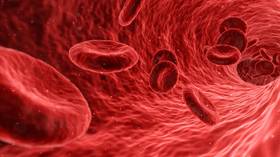‘Trojan Horse’: New nanoparticle can prevent heart attacks by 'eating' artery blockages FROM THE INSIDE

US scientists have developed a “Trojan Horse” nanoparticle that eats away at the fatty deposits which cause heart attacks and strokes from the inside out.
These fatty deposits, or plaques, are made up of cholesterol, fatty substances, cellular waste and other material.
The new nanoparticles are designed to selectively target a particular immune cell type and then deliver a drug payload which causes the cells to engulf and consume this accumulated material on blood vessel walls, thus removing the diseased or dead cells at the core of the plaque.
In other words, they cause the plaques to eat themselves from the inside out, thus reducing their size and stabilizing their growth.
Also on rt.com Cancer-fighting nanomeds can do more harm than good, new research saysThe research, carried out by scientists at Michigan State University and Stanford University and published in the current issue of Nature Nanotechnology, could lead to a treatment for atherosclerosis. The condition clogs the arteries with fatty growths and is among the leading causes of death in the US.
By the age of 40, an estimated 50 percent of the US population has the condition, but often do not experience symptoms. However, it can – and often does – lead to heart attacks and strokes.
Bryan Smith, associate professor of biomedical engineering at MSU, who spearheaded the development, said the team’s future work “will include clinical translation of these nanomaterials using large animal models and human tissue tests.”
He has filed a provisional patent in light of the unprecedented selectivity of the nanodrug.
Think your friends would be interested? Share this story!














